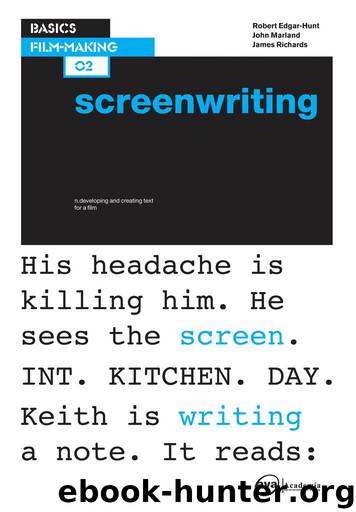Screenwriting by Robert Edgar & John Marland & James Richards

Author:Robert Edgar & John Marland & James Richards [Edgar, Robert & Marland, John & Richards, James]
Language: eng
Format: epub
ISBN: 9782940439263
Publisher: Bloomsbury Publishing
Published: 2017-12-14T06:00:00+00:00
Critiquing and feedback
You must cultivate a good critical eye – and ear – in order to spot the basic flaws in a particular script, and assess the general weaknesses in your work as a whole. You need to be able to look down on your own words with a stern and steady gaze. This is the key to developing as a successful screenwriter.
Novice writers often complain that becoming self-critical inhibits them. There is some truth in this; too much self-consciousness can stifle creativity in anyone. But a writer must be a sound judge of their own work. What is needed is positive self-scrutiny, which is a matter of balance: too little and you may be fooling yourself, too much and you can’t write at all.
Acquiring the necessary objectivity is a hard discipline. But eventually some of that objective awareness will percolate into the act of writing itself, so that you can sense when things aren’t quite right, and you won’t necessarily have to wait months to figure it out.
Receiving feedback
Of course, another means of gaining critical distance from your work is to invite someone else to read and comment on it. Ideally, they would know something about screenplays. Failing this, you certainly need to find someone who will tell you honestly what they think (good or bad), and who can express their views clearly. There is no point asking the opinion of someone who is afraid to offend you or of someone who can’t account for their response.
You also need to be able to listen to, and accept, criticism, which is often very hard when you have put so much of yourself into the project. So the best attitude on both sides is to be business-like. They should agree to be forthright, but constructive. You should leave your ego to one side, avoid being defensive and not take it personally.
After talking about your film, you may well see it in a different light. They may perceive something you haven’t, or find opaque something you thought was perfectly clear. This can be demoralising, but is not catastrophic. The worst thing you can do is to pretend that there isn’t a problem and that it will all come right in the end. If there’s a fundamental flaw in your concept and you can’t see what to do to fix it, then you should put the script to one side and start again on something new.
When you come back to the script much later you may see a solution – or you may not. This happens to the best writers and it doesn’t mean another script won’t work.
Even if you regard what they have to say as just plain wrong, and decide to stick to your guns (and you may indeed be right to do so), the chances are that you will have a much better understanding of the film you are writing than you did before.
Download
This site does not store any files on its server. We only index and link to content provided by other sites. Please contact the content providers to delete copyright contents if any and email us, we'll remove relevant links or contents immediately.
The Kite Runner by Khaled Hosseini(4431)
Gerald's Game by Stephen King(3918)
The Perils of Being Moderately Famous by Soha Ali Khan(3782)
Dialogue by Robert McKee(3582)
Story: Substance, Structure, Style and the Principles of Screenwriting by Robert McKee(2984)
The 101 Dalmatians by Dodie Smith(2935)
The Pixar Touch by David A. Price(2739)
Confessions of a Video Vixen by Karrine Steffans(2673)
Fantastic Beasts: The Crimes of Grindelwald by J. K. Rowling(2543)
How Music Works by David Byrne(2525)
Harry Potter 4 - Harry Potter and The Goblet of Fire by J.K.Rowling(2416)
Slugfest by Reed Tucker(2415)
The Mental Game of Writing: How to Overcome Obstacles, Stay Creative and Productive, and Free Your Mind for Success by James Scott Bell(2393)
Wildflower by Drew Barrymore(2117)
Scandals of Classic Hollywood: Sex, Deviance, and Drama from the Golden Age of American Cinema by Anne Helen Petersen(2109)
Casting Might-Have-Beens: A Film by Film Directory of Actors Considered for Roles Given to Others by Mell Eila(2071)
Screenplay: The Foundations of Screenwriting by Syd Field(2056)
Robin by Dave Itzkoff(2005)
The Complete H. P. Lovecraft Reader by H.P. Lovecraft(1976)
